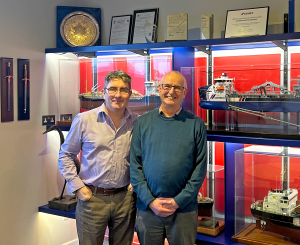After a career spanning over 40 years Graham Singleton, Resource and Systems Manager at Cemex Marine, retires next week. We wish Graham all the best in his retirement.
Kurt Cowdery, UK Marine, seen here in the photo with Graham, shared these words of thanks to his friend and colleague: “Graham has provided invaluable expertise and support in his role to our business throughout the years. He has built and developed a team to be proud of and recognised as leading within our industry. The role is very strategic and central in the development of our Mineral Reserves. He is great professional, committed and dedicated but above all else, a great guy. Enjoy your retirement, keep healthy and good luck.”
Graham’s career in Marine has been long and interesting so we wanted to share it here with you.
After leaving school Graham joined the Merchant Navy as a deck cadet, sailing ‘deep sea’ on a variety of cargo vessels in international waters. After four years at sea, achieving a Second Mate’s certificate, he came ashore to study for a degree in Maritime Geography at Cardiff University, and for his dissertation, many days were spent surveying various sandbanks in the Bristol Channel.
During the surveys he noticed the sand dredgers plying their trade and became aware of the wider marine aggregate dredging industry. After gaining his degree in 1984, he was able to join one of the companies in that industry, South Coast Shipping (SCS), part of RMC and subsequently Cemex.
Graham’s early years at SCS involved surveying most of the existing licence areas and prospecting for new areas in the seas around the UK and near continent. Offshore surveys took anything from a few days to several weeks, using a variety of ever-developing geophysical and sampling techniques. When not offshore Graham attended training sessions at Thorpe to learn about the technical aspects of aggregates, the basics of concrete and over time, many other topics.
Graham was also involved in updating the navigational systems on board our dredging vessels, from ‘WW2-era’ systems to more modern hydrographic survey-standard systems, and ultimately DGPS systems. Together with the advent of marinised PC plotters, this enabled cargos to be dredged more consistently and efficiently.
In time, new areas were applied for, to maintain our reserves. This required the management of environmental assessments and evolving application procedures, dealing with various Regulators and The Crown Estate. During this time, Graham was able to undertake an MSc in Coastal and Marine Resource Management which helped him keep abreast of evolving marine planning and regulatory frameworks. Given the regional and national aspects of many of the environmental issues to be considered, the marine section of our trade association (now BMAPA) played a strong role in the various regulator and advisor consultations, and he participated in the marine environmental and planning committee.
More recently, Graham took on the role of Resource and Systems Manager at Cemex Marine and assisted the shore and seafarer teams in managing the SMS requirements of the International Safety Management (ISM) Code. When communications technology allowed, we transitioned from a paper-based SMS system to an electronic ship-shore system. Data gathering and management continues to be a theme for both the Resource and SMS systems, wherever possible integrating with wider Cemex systems.
The developments above, and those in the pipeline, could not have occurred without the fantastic cooperation, input, and ideas of the resource & systems teams and of all the related shore and ship-based teams, for which Graham would like to give many thanks to all involved.
